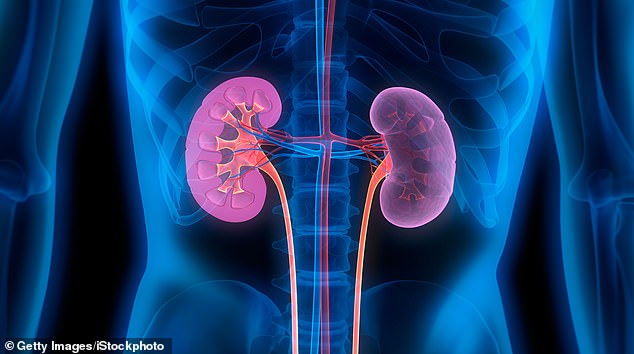NHS crisis fears as the number of people needing life-saving dialysis treatment is expected to quadruple over the next decade, a kidney disease charity warns
- It is necessary when the kidneys fail and the organs cannot remove the toxins from the blood
- Currently approximately 30,000 people require dialysis, increasing to 143,000 in 2033
The number of people regularly needing life-saving dialysis treatment on the NHS is expected to rise by almost 400 per cent over the next decade, a leading kidney disease charity has warned.
The crucial blood cleansing procedure is needed when the kidneys fail, meaning the organs can no longer remove dangerous toxins from the blood.
Currently, about 30,000 adults and children need dialysis, which means going to the hospital several times a week to be hooked up to a machine for hours. But according to Kidney Research UK, this figure is expected to rise to around 143,000 by 2033.
The charity has called on the NHS to take urgent action to detect chronic kidney disease at its early stages, to help limit the number of patients who will progress to the point where they need dialysis or a kidney transplant.
Currently, about 30,000 adults and children need dialysis, which means going to the hospital several times a week to be hooked up to a machine for hours.
Chronic kidney disease occurs when the kidneys – which remove waste products from the blood and produce urine – no longer work as well as they should. It usually gets worse over time and the damage cannot be reversed.
The condition affects roughly 7.2 million Britons, but is expected to increase by around 400,000 over the next decade – mainly due to the increasing number of people with high blood pressure and obesity. Patients with high blood pressure and diabetes are at greatest risk of developing the disease.

Chronic kidney disease occurs when the kidneys – which remove waste products from the blood and produce urine – no longer work as well as they should
Because there are often no early symptoms of chronic kidney disease, many patients will not be diagnosed until the disease has become severe. At this stage they often require dialysis. However, at the end of last year, The Mail on Sunday revealed that 40 percent of people with high blood pressure and diabetes are not offered a simple urine test by their GP, which can be used to detect kidney problems early. Kidney Research UK is calling on GPs to ensure all at-risk patients are offered the test.
The urine test checks for a protein called albumin, which is filtered by the kidneys. A high level of albumin is a sign that the organs are not working properly.
“Early detection of kidney disease is crucial to slowing progression and giving patients the best possible quality of life,” said Alison Railton, head of policy and external affairs at Kidney Research UK.
‘The Government and the NHS must do more to ensure that people at risk of developing chronic kidney disease are tested routinely.’
